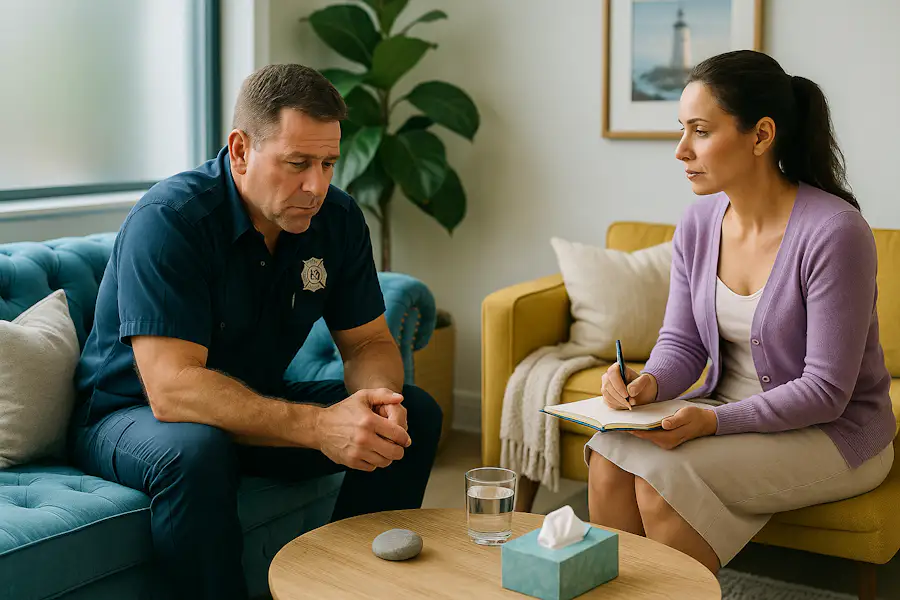Who Is This Program For?
This program is for people who carry the emotional weight of crisis, trauma, and responsibility, often in silence. You might be:
- A police officer, firefighter, or paramedic
- A 911 dispatcher, emergency room doctor, or nurse
- A train conductor involved in critical incidents
- A child welfare worker, parole or probation officer
- A correctional officer, military member, or veteran
- A hospital worker or security staff dealing with trauma on repeat
If your job puts you in contact with emergencies, human suffering, or high emotional pressure, this is for you.
Not sure if you fit? Reach out. We’ll let you know if this program is the right fit, or connect you with something that is.
Why This Program Exists
You’ve probably been trained to handle crisis, but not to talk about how it affects you. For many in your line of work, therapy feels like a last resort, or something that could come back to bite you. That’s why this program was created: to offer confidential, non-diagnostic, stigma-free support from trauma-informed professionals who get it.
This program was built by a clinician who provided trauma support on the ground with the United Nations in post-earthquake Haiti, where emergency responders were often the ones most in need of care, but least likely to ask for it.
You don’t need to be in crisis to check in. You don’t have to explain why your job is different. And you don’t have to worry that what you say will end up in the wrong hands.
This is mental wellness support made for you, because showing up for others shouldn’t mean losing yourself in the process.
How It Works
A straightforward process, built for busy people who don’t want to waste time or retell their story over and over.
Initial Phone Consultation
You’ll start with a free 20-minute phone call with our intake coordinator. It’s confidential, no-pressure, and gives you a chance to ask questions before committing to anything.
The Intake Session (90 minutes)
Before your first session, you’ll complete a short online workbook that includes a few self-guided emotional wellness check-ins. These assessments are optional, free, and meant to give us a baseline, not a diagnosis.
In the session, your therapist will review your results with you and get a full picture of how you’ve been doing-mentally, emotionally, and professionally.
Next Steps Tailored To Your Needs
At the end of the intake, you and your therapist will talk about next steps. This might include:
- Starting regular therapy for recent or cumulative trauma, or for working through burnout, compassion-fatigue, moral injury, or just a place to vent
- An EMDR intensive if something big has happened
- A low-key maintenance plan with 30-minute check-in sessions, every 4 to 6 weeks. So you always have someone in your corner
There’s no pressure to choose anything on the spot. This is about building something that works for you, not fitting you into a box.
Frequently Asked Questions
What is the maintenance plan?
The maintenance plan offers short, 30-minute check-in sessions, either online or in person. These are structured, low-pressure conversations designed to help you decompress, vent, or process ongoing stress. You don’t need to be in crisis to use it. It’s a way to keep a connection with your therapist so support is already in place if something heavier happens down the line.
This plan is for when you don’t need, or want, to start therapy. It offers a chance to start forming a therapeutic bond with your therapist, something that comes in handy if you ever do need to start therapy.
Is this program covered by insurance?
It might be, it depends on what is covered in your insurance benefits. Sessions are billed as psychotherapy with a Registered Psychotherapist (RP) or Registered Social Worker (RSW), depending on your therapist. Most extended health plans in Ontario cover services with an RP or RSW. You’ll receive a receipt to submit for reimbursement.
Please check your insurance plan to see if your benefits cover for our services.
Is it covered by WSIB?
Unfortunately not. This program is intentionally offered outside of WSIB. That means we do not report to WSIB, and there is no formal file or employer-linked claim. This ensures your care stays private and on your terms.
Will my sessions be confidential?
Yes. Everything you share is confidential and protected under Ontario’s privacy laws for healthcare. We do not share information with your employer, WSIB, or any other organization. The only exceptions to confidentiality are the standard legal ones (e.g., risk of harm to self or others), which we’ll explain clearly before we begin.
Do I need a diagnosis to access this program?
No diagnosis is required. We don’t pathologize your experience or label you. This program is about support, prevention, and processing, not assigning a diagnosis.
What if I don't have a traumatic incident?
You’re still welcome here. Many people in high-stress roles benefit from checking in before something becomes overwhelming. You don’t need a single defining event to seek support.
What if I don't want to start therapy?
That’s okay. You can use the intake session as a one-time check-in, or choose the maintenance plan without starting ongoing therapy. You stay in control of what level of support feels right.
What does it cost?
Initial 20-minute phone consult: Free
Intake session (90 minutes): $225 – $315
Check-in sessions (30 minutes): $75 – $105
Standard therapy sessions (60 minutes): $150 – $210
All sessions are billed per hour with receipts provided for insurance.
Are online and in-person sessions available?
Yes. You can choose what works best for you, many clients prefer the flexibility of virtual care, while others value the privacy of in-office appointments. We’ll talk about what fits your schedule and comfort level during your intake.
Can I switch from the maintenance plan to therapy (or the other way around)?
Absolutely. This program is flexible. If things shift in your life or work and you want more (or less) support, we’ll adapt. You don’t need to justify anything-we’ll meet you where you are.
What if I already use my EAP or a peer support team?
This program can work alongside what you’re already doing. Many clients find EAP too limited or impersonal, and peer support can only go so far. This gives you space for deeper, confidential, trauma-informed care.
Who are the therapists?
We’re a team of experienced, trauma-focused clinicians who’ve worked with frontline workers, first responders, and emergency staff for years. The program was created by Marleen Filimon, Owner and Registered Psychotherapist. She has UN field trauma experience in Haiti, so we understand the weight of high-stakes work. You can read more about our team below.
Currently, the following therapists offer this program
Marleen Filimon
Tricia Raynsford


